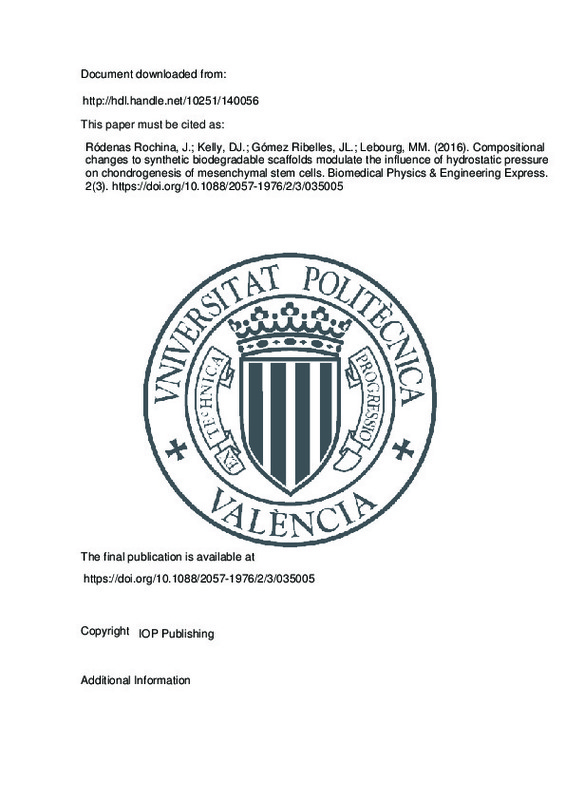Hunziker, E. B. (2002). Articular cartilage repair: basic science and clinical progress. A review of the current status and prospects. Osteoarthritis and Cartilage, 10(6), 432-463. doi:10.1053/joca.2002.0801
Redman, S., Oldfield, S., & Archer, C. (2005). Current strategies for articular cartilage repair. European Cells and Materials, 9, 23-32. doi:10.22203/ecm.v009a04
Liao, S., Chan, C. K., & Ramakrishna, S. (2008). Stem cells and biomimetic materials strategies for tissue engineering. Materials Science and Engineering: C, 28(8), 1189-1202. doi:10.1016/j.msec.2008.08.015
[+]
Hunziker, E. B. (2002). Articular cartilage repair: basic science and clinical progress. A review of the current status and prospects. Osteoarthritis and Cartilage, 10(6), 432-463. doi:10.1053/joca.2002.0801
Redman, S., Oldfield, S., & Archer, C. (2005). Current strategies for articular cartilage repair. European Cells and Materials, 9, 23-32. doi:10.22203/ecm.v009a04
Liao, S., Chan, C. K., & Ramakrishna, S. (2008). Stem cells and biomimetic materials strategies for tissue engineering. Materials Science and Engineering: C, 28(8), 1189-1202. doi:10.1016/j.msec.2008.08.015
Huang, A. H., Farrell, M. J., & Mauck, R. L. (2010). Mechanics and mechanobiology of mesenchymal stem cell-based engineered cartilage. Journal of Biomechanics, 43(1), 128-136. doi:10.1016/j.jbiomech.2009.09.018
Gelse, K., Ekici, A. B., Cipa, F., Swoboda, B., Carl, H. D., Olk, A., … Klinger, P. (2012). Molecular differentiation between osteophytic and articular cartilage – clues for a transient and permanent chondrocyte phenotype. Osteoarthritis and Cartilage, 20(2), 162-171. doi:10.1016/j.joca.2011.12.004
Vinardell, T., Sheehy, E. J., Buckley, C. T., & Kelly, D. J. (2012). A Comparison of the Functionality and In Vivo Phenotypic Stability of Cartilaginous Tissues Engineered from Different Stem Cell Sources. Tissue Engineering Part A, 18(11-12), 1161-1170. doi:10.1089/ten.tea.2011.0544
Girotto, D., Urbani, S., Brun, P., Renier, D., Barbucci, R., & Abatangelo, G. (2003). Tissue-specific gene expression in chondrocytes grown on three-dimensional hyaluronic acid scaffolds. Biomaterials, 24(19), 3265-3275. doi:10.1016/s0142-9612(03)00160-1
Wu, J., Xue, K., Li, H., Sun, J., & Liu, K. (2013). Improvement of PHBV Scaffolds with Bioglass for Cartilage Tissue Engineering. PLoS ONE, 8(8), e71563. doi:10.1371/journal.pone.0071563
Carlisle, E. M. (1988). Silicon as a trace nutrient. Science of The Total Environment, 73(1-2), 95-106. doi:10.1016/0048-9697(88)90190-8
Hubka, K. M., Dahlin, R. L., Meretoja, V. V., Kasper, F. K., & Mikos, A. G. (2014). Enhancing Chondrogenic Phenotype for Cartilage Tissue Engineering: Monoculture and Coculture of Articular Chondrocytes and Mesenchymal Stem Cells. Tissue Engineering Part B: Reviews, 20(6), 641-654. doi:10.1089/ten.teb.2014.0034
Vinatier, C., Mrugala, D., Jorgensen, C., Guicheux, J., & Noël, D. (2009). Cartilage engineering: a crucial combination of cells, biomaterials and biofactors. Trends in Biotechnology, 27(5), 307-314. doi:10.1016/j.tibtech.2009.02.005
Kelly, D. J., & Jacobs, C. R. (2010). The role of mechanical signals in regulating chondrogenesis and osteogenesis of mesenchymal stem cells. Birth Defects Research Part C: Embryo Today: Reviews, 90(1), 75-85. doi:10.1002/bdrc.20173
Welter, J. F., Solchaga, L. A., & Baskaran, H. (2012). Chondrogenesis from Human Mesenchymal Stem Cells: Role of Culture Conditions. Stem Cells and Cancer Stem Cells, Volume 5, 269-280. doi:10.1007/978-94-007-2900-1_26
Grad, S., Eglin, D., Alini, M., & Stoddart, M. J. (2011). Physical Stimulation of Chondrogenic Cells In Vitro: A Review. Clinical Orthopaedics and Related Research®, 469(10), 2764-2772. doi:10.1007/s11999-011-1819-9
Kessler, M. W., & Grande, D. A. (2008). Tissue engineering and cartilage. Organogenesis, 4(1), 28-32. doi:10.4161/org.6116
Elder, B. D., & Athanasiou, K. A. (2009). Hydrostatic Pressure in Articular Cartilage Tissue Engineering: From Chondrocytes to Tissue Regeneration. Tissue Engineering Part B: Reviews, 15(1), 43-53. doi:10.1089/ten.teb.2008.0435
Wagner, D. R., Lindsey, D. P., Li, K. W., Tummala, P., Chandran, S. E., Smith, R. L., … Beaupre, G. S. (2008). Hydrostatic Pressure Enhances Chondrogenic Differentiation of Human Bone Marrow Stromal Cells in Osteochondrogenic Medium. Annals of Biomedical Engineering, 36(5), 813-820. doi:10.1007/s10439-008-9448-5
Meyer, E. G., Buckley, C. T., Steward, A. J., & Kelly, D. J. (2011). The effect of cyclic hydrostatic pressure on the functional development of cartilaginous tissues engineered using bone marrow derived mesenchymal stem cells. Journal of the Mechanical Behavior of Biomedical Materials, 4(7), 1257-1265. doi:10.1016/j.jmbbm.2011.04.012
Wong, M., Siegrist, M., & Goodwin, K. (2003). Cyclic tensile strain and cyclic hydrostatic pressure differentially regulate expression of hypertrophic markers in primary chondrocytes. Bone, 33(4), 685-693. doi:10.1016/s8756-3282(03)00242-4
Carroll, S. F., Buckley, C. T., & Kelly, D. J. (2014). Cyclic hydrostatic pressure promotes a stable cartilage phenotype and enhances the functional development of cartilaginous grafts engineered using multipotent stromal cells isolated from bone marrow and infrapatellar fat pad. Journal of Biomechanics, 47(9), 2115-2121. doi:10.1016/j.jbiomech.2013.12.006
Steward, A. J., Thorpe, S. D., Vinardell, T., Buckley, C. T., Wagner, D. R., & Kelly, D. J. (2012). Cell–matrix interactions regulate mesenchymal stem cell response to hydrostatic pressure. Acta Biomaterialia, 8(6), 2153-2159. doi:10.1016/j.actbio.2012.03.016
Villanueva, I., Weigel, C. A., & Bryant, S. J. (2009). Cell–matrix interactions and dynamic mechanical loading influence chondrocyte gene expression and bioactivity in PEG-RGD hydrogels. Acta Biomaterialia, 5(8), 2832-2846. doi:10.1016/j.actbio.2009.05.039
Peter, M., Binulal, N. S., Nair, S. V., Selvamurugan, N., Tamura, H., & Jayakumar, R. (2010). Novel biodegradable chitosan–gelatin/nano-bioactive glass ceramic composite scaffolds for alveolar bone tissue engineering. Chemical Engineering Journal, 158(2), 353-361. doi:10.1016/j.cej.2010.02.003
Ródenas-Rochina, J., Ribelles, J. L. G., & Lebourg, M. (2013). Comparative study of PCL-HAp and PCL-bioglass composite scaffolds for bone tissue engineering. Journal of Materials Science: Materials in Medicine, 24(5), 1293-1308. doi:10.1007/s10856-013-4878-5
Lennon, D. P., & Caplan, A. I. (2006). Isolation of human marrow-derived mesenchymal stem cells. Experimental Hematology, 34(11), 1604-1605. doi:10.1016/j.exphem.2006.07.014
Thorpe, S. D., Buckley, C. T., Vinardell, T., O’Brien, F. J., Campbell, V. A., & Kelly, D. J. (2008). Dynamic compression can inhibit chondrogenesis of mesenchymal stem cells. Biochemical and Biophysical Research Communications, 377(2), 458-462. doi:10.1016/j.bbrc.2008.09.154
Connelly, J. T., García, A. J., & Levenston, M. E. (2007). Inhibition of in vitro chondrogenesis in RGD-modified three-dimensional alginate gels. Biomaterials, 28(6), 1071-1083. doi:10.1016/j.biomaterials.2006.10.006
[-]







![[Cerrado]](/themes/UPV/images/candado.png)


